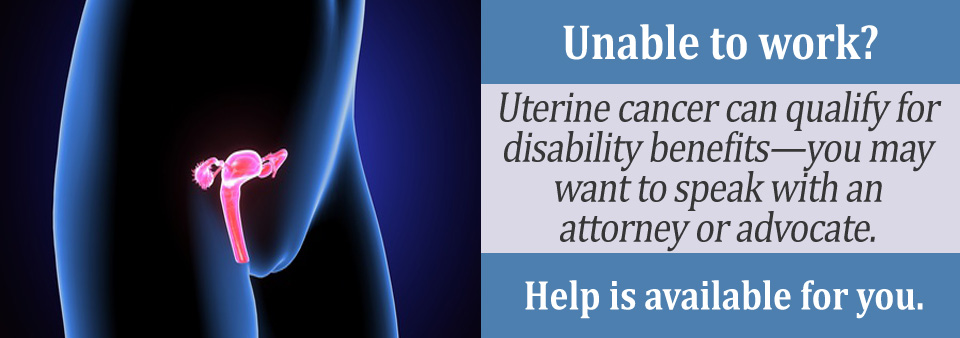Uterine cancer has probably already affected most aspects of your life. The disease itself and the treatment can be exhausting, and the addition of medical bills may be adding even more stress to your already full plate.
It doesn’t have to be this way. Think about applying for Social Security disability benefits; they were made specifically for this kind of situation. SSD benefits are for people whose conditions have left them unable to work, meaning that they were made for people just like you.
Your uterine cancer may mean that you can’t work, but it doesn’t mean that your quality of life should be diminished. Apply for SSD benefits and start getting the financial benefits you need to survive and continue focusing on your recovery.
Uterine Cancer Blue Book Listing
Social Security disability benefits are distributed by the Social Security Administration, which is the organization that determines who gets benefits. In order to decide who gets benefits, the Social Security Administration adheres to a set of guidelines known as the Blue Book.
The Blue Book lists the conditions that allow a person to qualify for SSD benefits, making it an invaluable resource to familiarize yourself with if you’re considering applying for benefits.
The Blue Book is divided into 14 sections, and Section 13.00 is the one on cancer. Uterine cancer is listed in Section 13.23 (“Cancers of the female genital tract - carcinoma or sarcoma”) in subsections A and B.
Subsections A and B describe how your uterine cancer would have to manifest itself in order for you to qualify.

Based on the Blue Book’s guidelines, you can qualify for two types of uterine cancer:
Uterus corpus: If you’re applying under the uterus corpus listing, you can qualify for benefits if the cancer is invading nearby organs, going beyond the original lymph nodes, and/or keeps coming back even after anti-cancer therapy.
Uterine cervix: Similarly, if you’re applying under the uterine cervix listing, you can qualify for benefits if your cancer extends to either the pelvic wall, nearby or faraway organs, and/or the lower part of the vagina; keeps coming back in spite of anti-cancer treatment; or spreads to lymph nodes.
Talk to your physician if you suspect that your uterine cancer would meet the SSD listing; you’ll need your physician’s help with getting together the medical documents for your application. You have to do this in order to prove that your condition exists and entitles you to benefits.
Fortunately, there are a number of acceptable documents that would help your application, including doctor’s notes, x-rays, MRI/CT scans, and biopsy/test results--anything that gives a complete picture of your illness will do. Then, get those documents all in one place so that they’re ready for when you apply.
Compassionate Allowance
SSD benefits can be incredibly helpful once you qualify for them. Unfortunately, it can take well over a year to even get a hearing, depending on where you live. This may make some applicants feel helpless, particularly if they need benefits right away to help offset the living costs that come with dealing with an advanced condition.
Thankfully, Compassionate Allowances could be an option for you. The Compassionate Allowance Initiative is a way to help those whose conditions are particularly severe and advanced by expediting the process of getting benefits. Basically, Compassionate Allowances mean that you’ll get approved for benefits more quickly, in less than ten days in some cases.
Like traditional SSD benefits, you’ll still have to qualify, and the list of qualifying conditions is quite a bit shorter.
The Compassionate Allowance Initiative doesn’t list all uterine cancers, but it does list endometrial stromal sarcomas as a qualifying condition. Endometrial stromal sarcomas are a very rare type of uterine cancer, and if you suspect that you have them, contact your doctor right away to get the necessary documents to apply for Compassionate Allowance benefits.
How an Attorney Can Help
Uterine cancer has taken away your ability to work, but that doesn’t mean it should take away your financial stability. Find an attorney so that you can get professional help with the application process.
It’ll improve your chances of getting approved, and perhaps more importantly, it’ll let you channel all of your energy into your recovery.